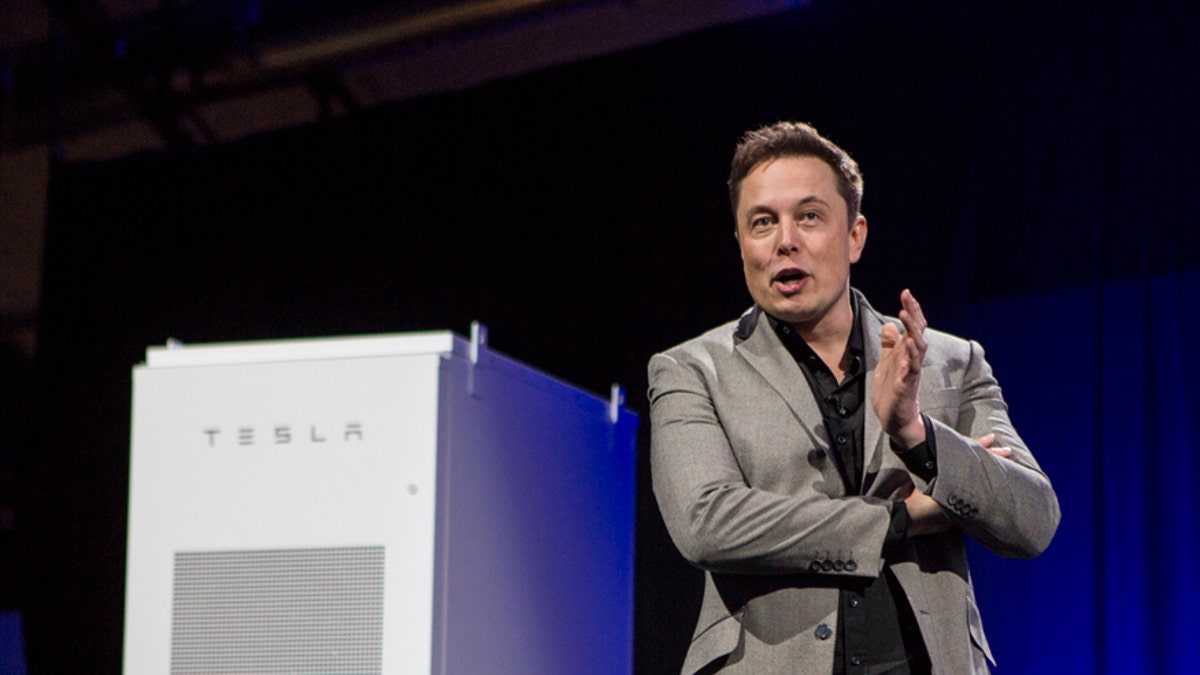
Elon Musk, CEO of Tesla Motors Inc., unveils the company's newest product, Powerpack in Hawthorne, Calif., Thursday, April. 30, 2015. (AP Photo/Ringo H.W. Chiu)
On Thursday, Tesla rolled out a suite of batteries in an effort to wean the U.S. – and the world – off fossil fuels. And, of course, convince Americans to buy lots of its batteries.
“Tonight is about a fundamental transformation about how the world works,” CEO Elon Musk said during a presentation on at an event at the Tesla Design Studio in Hawthorne, Calif. announcing Tesla Energy batteries.
Saying that Tesla is no longer just an automotive company, Musk is looking to enable homes, businesses, and utilities to both store and manage solar energy.
“We have this handy fusion reactor in the sky called the sun [which] produces ridiculous amounts of power,” Musk said.
To tap that power for the home, Tesla announced Powerwall, a rechargeable lithium-ion battery designed to store energy at a residential level “for load shifting, backup power and self-consumption of solar power generation,” Tesla said in a statement.
The Powerwall consists of Tesla’s lithium-ion battery pack, liquid thermal control system and software that receives dispatch commands from a solar inverter. The unit mounts on a wall and harnesses “excess power to give customers the flexibility to draw energy from their own reserve,” according to Tesla.
The ultimate goal is to produce the batteries at Tesla’s gigafactory, now under construction in Nevada.
“Initially the ramp will be slow because the [battery] packs will be made in our Fremont [Calif.] factory,” Musk said.
“Next year the ramp will go much, much higher as we transition to the gigafactory in Nevada,” he added.
By scaling up production at its gigafactory, Musk wants to mass produce Powerwall for American homes.
“A normal household can mount this on their garage or on the outside wall of their house,” Musk said.
He continued. “The problem with existing batteries is that they’re expensive, they’re unreliable, they’re ugly and there’s not one single place you can go and buy a battery that just works.”
To illustrate that it is possible to completely transform power usage in the U.S., Musk, during his presentation, showed a map of the country.
“Very little land is needed to get rid of all the fossil fuel generation in the United States,” Musk said.
On the map was a small blue square – roughly the size of a large state county in the U.S.
“That blue square is all of the land area that’s needed to transition the U.S. to a zero carbon electricity situation. And most of that area is rooftops…the roofs of existing homes,” Musk said.
Musk continued. “We need to store the energy that is generated during the day so we can use it at night…and there’s a lot more energy generated in the middle of the day than at dawn or dusk. So it’s very important to smooth out that energy generation and retain enough so you can use it at night,” he said.
Tesla threw out all sorts of statistics to back up its argument for storing solar power. “The US electric power sector alone produces over 2,000 million metric tons of CO2 which is like burning 225 billion gallons of gas. The EPA says it would require 1.6 billion acres of US forest to negate the environmental damage,” the company said, in its statement.
The Powerwall is available in 10kWh, optimized for backup applications or 7kWh optimized for daily use applications. Both can be connected with solar or grid and both can provide backup power.
The 10kWh Powerwall is optimized to provide backup when the grid goes down. When paired with solar power, the 7kWh Powerwall can be used in daily cycling to extend the environmental and cost benefits of solar into the night when sunlight is unavailable, Tesla said.
Tesla’s selling price to installers is $3,500 for 10kWh and $3,000 for 7kWh. (Price excludes inverter and installation.) Deliveries begin in late summer.
The company also announced the Powerpack – a larger battery pack -- that “scales to much larger levels,” according to Musk. That includes “gigawatt class installations…to power small cities,” according to Musk.
Tesla said it is already working with utilities and other renewable power partners around the world.
